September 17, 2025. Myanmar Survey Day 2, Visiting Refugee Camps, Delivering Relief Supplies
Hello. The second morning has dawned in Mandalay, Myanmar. Today, Sunim continued the survey of earthquake-affected areas in Myanmar, following yesterday’s activities.
After completing morning practice and breakfast, Sunim conducted a live online Weekly Dharma Assembly starting at 7:30 AM.
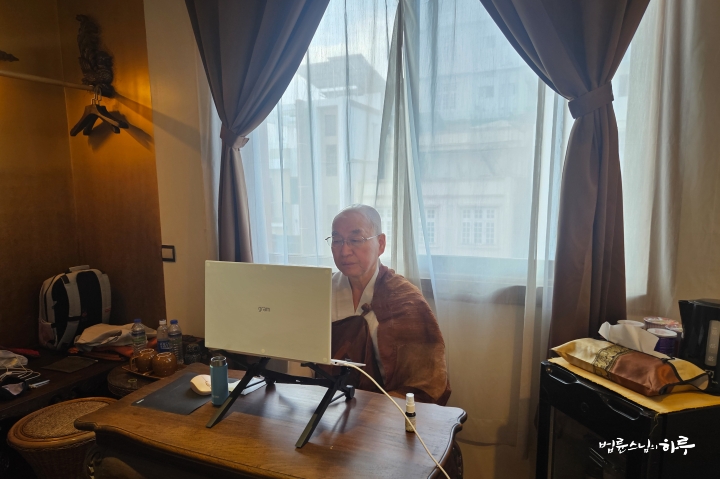
Once all Jungto Society members had entered the video conference room, they recited the Three Refuges and the Heart Sutra, then watched a video of weekly Jungto practitioner news together.
After the video ended, the assembly requested a Dharma talk from Sunim with three prostrations. Sunim first briefly explained why he had come to Myanmar and his future survey plans for Southeast Asia.
People Left Behind in Civil War and Earthquakes
“I am currently in the Mandalay region of Myanmar, where a major earthquake occurred earlier this year, after completing my European lecture tour. Myanmar is currently facing two major problems. First, military conflicts between the government and anti-government forces have led to civil war, creating refugees. Many people are fleeing across the border to Thailand or leaving their hometowns to relocate to other regions within the country. Second, most houses were destroyed in the recent earthquake. With reconstruction difficult and civil war compounding the situation, additional refugees have emerged. So today, I plan to visit refugee camps that are being cared for by nearby temples rather than international organizations. This area was formed by eight villages coming together, with a population of about 4,400 people and approximately 1,700 households. After surveying the site, I plan to establish support measures.
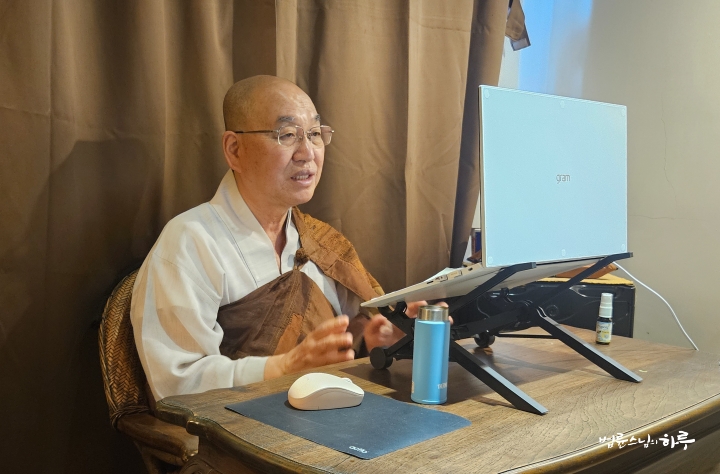
Tomorrow, I will travel to Cambodia to visit a university where we built a dormitory last time that can accommodate 64 female students from rural areas. Female students from rural areas come to the city to attend university, but without dormitories, they rent small rooms where several students live together, exposing them to danger. So last year, we built a female student dormitory, and there has been a request to build additional dormitories, which I plan to survey.
The day after tomorrow, I will move to northern Thailand. I plan to visit the border area where Myanmar refugees cross over and the regions affected by recent major flooding to discuss what assistance can be provided. Since Thailand is a Buddhist country, when refugees cross over, boys can be protected as ‘novice monks’ by having their heads shaved, which prevents deportation even without citizenship. However, there is a problem with properly protecting girls. To protect them like the boys, they would need to become ‘nuns,’ female monastics, but Thailand does not recognize bhikkhunis. If placed in regular orphanages, they risk deportation. So I’m looking for ways to provide accommodation and schools to protect these girls.
The original plan was to visit Syria to help with post-war reconstruction, but the situation in Southeast Asia has become more urgent, so I changed the schedule and am now surveying the Southeast Asian region.”
Sunim then began conversations with people who had submitted questions in advance. Four people asked questions during the hour. One of them mentioned recent visa issues in the United States and conflicts surrounding refugee accommodation facilities in the UK, seeking Sunim’s advice on the deepening conflicts between immigrants and local residents worldwide.
How Should We View the Refugee and Migrant Issue from a Buddhist Perspective?
“Looking at the global phenomenon, the biggest problem is wealth inequality. As wealth gaps between countries deepen and extreme inequality grows within each country, resistance to refugees emerges. First, as gaps between nations widen, people from poor countries can no longer survive in their own countries and must ultimately move to wealthy nations for survival. Second, as wealth gaps deepen even within wealthy nations, poor people who are already struggling face job losses or wage decreases due to refugee influx. In this situation, resistance to refugees occurs. Ultimately, the refugee problem is a phenomenon arising from deepening wealth inequality and is a structural problem that will inevitably worsen.
To fundamentally reduce the refugee problem, we need to provide sufficient development support to poor countries so their people can make a living in their own nations. Simultaneously, reducing wealth gaps within wealthy countries could ease resistance to refugees. However, the reality is that both sides are in a state of extreme polarization. This is why refugee movements continue to increase and resistance toward refugees is growing in each country.
From a Buddhist perspective, refugees in danger must be cared for unconditionally. This is also the basic spirit promoted by the UN. Refugees facing starvation due to economic hardship are also individuals requiring protection. However, while international agreements exist for protecting refugees from political persecution, opinions differ on refugees from economic poverty. There are claims that illegal residents who haven’t gone through legal procedures should be sent back to their home countries. China’s forced repatriation of North Korean defectors is a representative example.
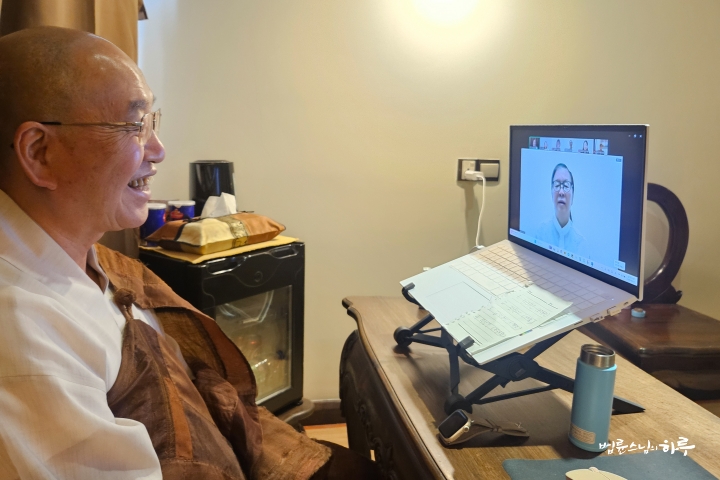
Refugees who move not because they cannot survive but to seek a better life must go through legal procedures. However, in reality, political refugees, natural disaster victims, and refugees from political turmoil or economic poverty are often all mixed together and classified as illegal immigrants. This leads to conflicting arguments between “At least we should stop illegal immigrants” and “We should accept refugees because they left their homeland due to difficult living conditions.” In fact, leaving one’s hometown is rarely a choice made when life is manageable—most people leave because life has become too difficult. That’s why opinions arise about accepting refugees. At the same time, there are also opinions that those who stay illegally without going through legal procedures should be regulated.
From a Buddhist perspective, everyone should be allowed to live where they want to live. However, realistically, if excessive illegal stays are not regulated to some extent, social order can easily collapse, which can lead to significant resistance.
The recent incident in Georgia, USA, where Korean technicians were arrested and detained en masse, is different in nature from simple illegal immigration issues. While work cannot be done on tourist visas, the legal visa issuance process was too complicated in a situation where factories urgently needed to be built. So they chose to send technicians on short-term visas to provide technical guidance for one or two months and then return. Strictly speaking, this didn’t match the purpose of the visa, but it wasn’t intended for illegal stay either. Nevertheless, the U.S. immigration authorities viewed it as illegal and made arrests, and some technicians were detained together even though they had proper visas. Moreover, treating them like criminals by putting them in chains was an excessive measure and could be considered a human rights violation. From the Korean companies’ perspective, it was an unavoidable choice because the U.S. government requested them to build factories but wouldn’t issue visas.
Common sense tells us that Korea is an ally and friend of the United States. The Korean president recently visited the United States and promised cooperation between the two countries. Then there should have been at least advance notice. If they had said, “We’ve tolerated some illegal activities as needed until now, but we’re going to strengthen immigration policy. Therefore, everyone must leave within one month. Then we’ll provide legal visas,” that would have been understandable. However, showing up without any warning and putting technicians in chains and detention facilities is something that shouldn’t happen between allied nations. It was a measure at the level of what would be done to hostile countries. Especially since some were taken even though they had legal visas, it’s natural for Korean citizens to feel skeptical about the alliance with the United States. No matter what the U.S. circumstances are, if we’re friends, we should show trust and friendship, but this incident showed none of that. Moreover, around the same time, Chairman Kim Jong-un attended the Victory Day celebration in Beijing, China, had summit meetings with President Xi Jinping and President Putin respectively, and was shown receiving equal treatment on the international stage, which further hurt our citizens’ pride.
However, this phenomenon will continue for some time. Similar situations are continuing not only in the United States but also in other countries like Europe. Hatred and rejection of immigrants will grow stronger, and forces trying to use this politically will exploit this situation to gain public support. Those living abroad may feel anxious about this, but they should understand it as a global phenomenon and live more carefully.”
“After listening to Sunim’s words, I thought, ‘Economic inequality is the root of all problems.’ On the other hand, I also wondered what I could do as a citizen in the current situation where it’s difficult to support struggling countries immediately or solve fundamental problems.”
“What I can do as a citizen is not to treat immigrants or refugees coldly but to care for them warmly. If there are refugees or migrants around you, you can smile at them or treat them warmly when working. It would also be good to participate in activities to protect multicultural families or migrants through civic organizations. You could also provide places where migrants can gather conveniently.
On the other hand, there are also people around us who react against migrants. While it’s not desirable, there may be people who have hostility. Some politicians or YouTubers exaggerate information to increase views and incite people. If you don’t understand this reality, you’ll only feel anger, so it’s necessary to understand the situation well.”
“I understand well.”
Questions continued to follow.
In one month, I experienced voice phishing, a traffic accident, the flu, and falling down stairs all at once. How should I accept this situation from a practice perspective?
I’m a pregnant woman about to give birth soon. I’m worried about whether I can raise my child with love.
I divorced my husband and started a business alone. I’m embarrassed because people gossip a lot about a woman meeting male clients alone where I do business.
After finishing the dialogue, Sunim gave closing remarks.
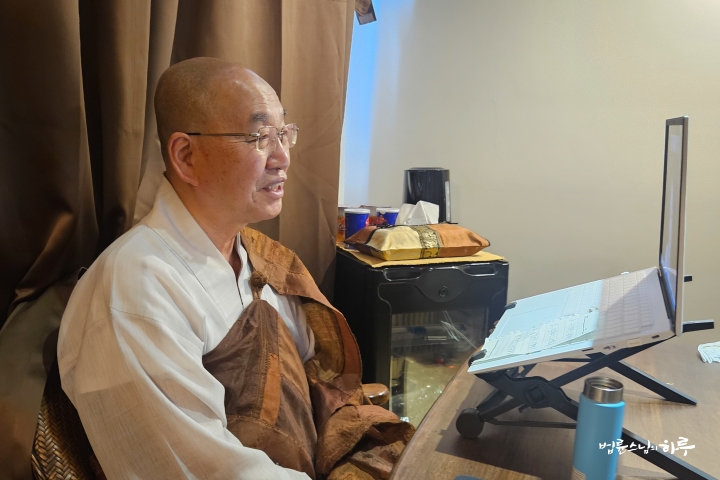
“Although the power and audio conditions here weren’t good, I’m glad we could safely finish the Weekly Dharma Assembly. I will now leave to visit the refugee camps.”
After finishing the live broadcast, Sunim departed for the Sagaing IDP (Internally Displaced Persons) camp at 9 AM. While it should have been a short distance if they could cross the river, they had to take a long detour because it was a military area. After an hour and a half drive, they arrived at the refugee camp at 10:30 AM. Inside the camp, refugees who had left their homes due to earthquakes and conflicts had settled and were living. Sunim toured the houses where people lived, toilets, and water tanks in order.
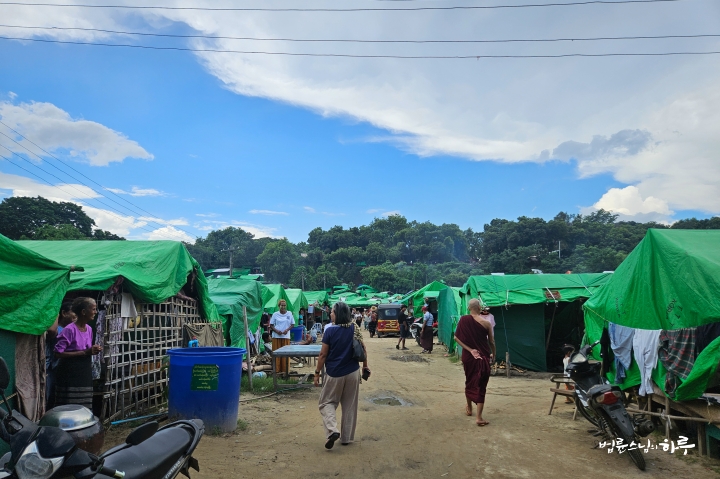
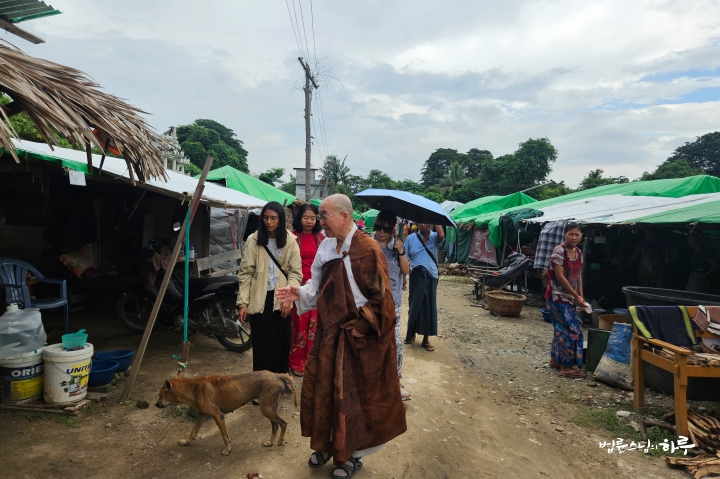
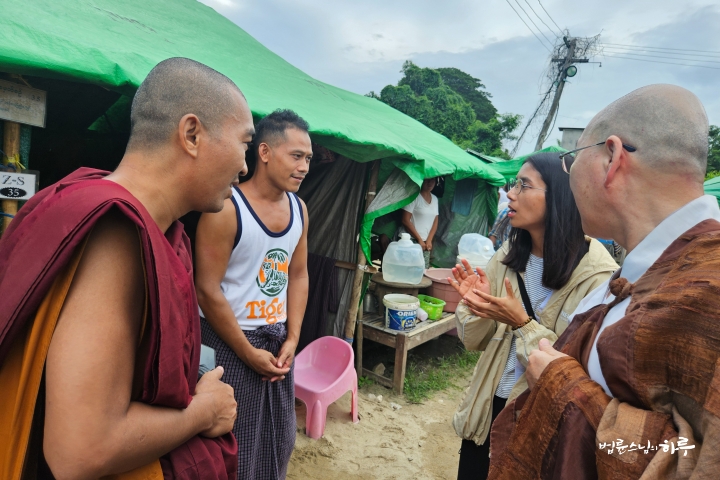
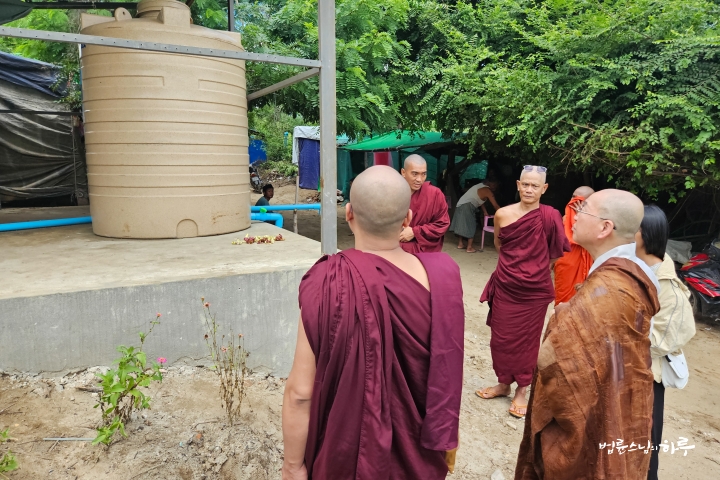
Children were gathered together studying in temporary classrooms made of bamboo.
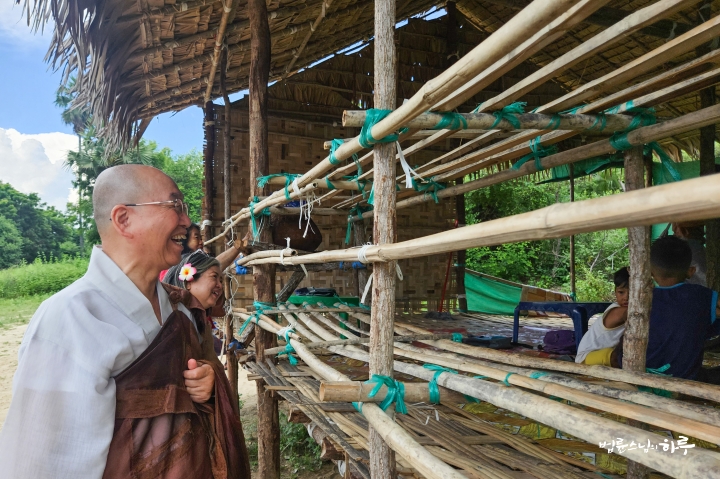
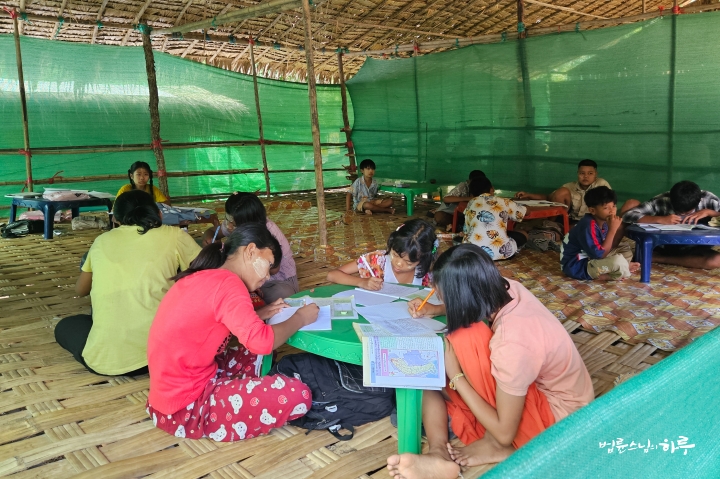
First, school supplies prepared by INEB (International Network of Engaged Buddhists) were delivered to the children.
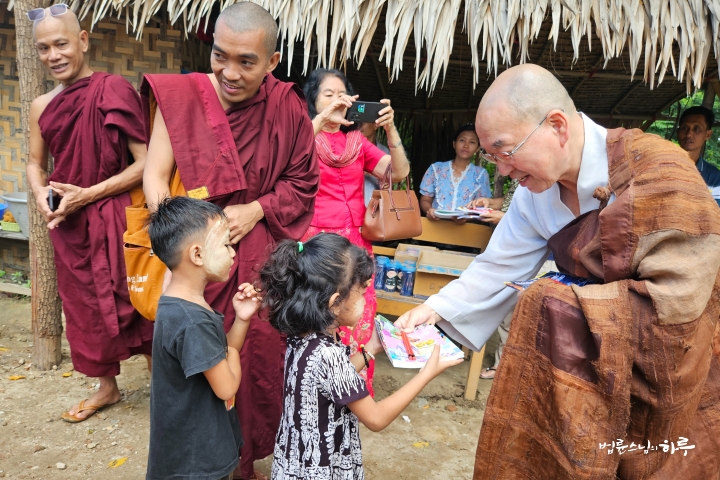
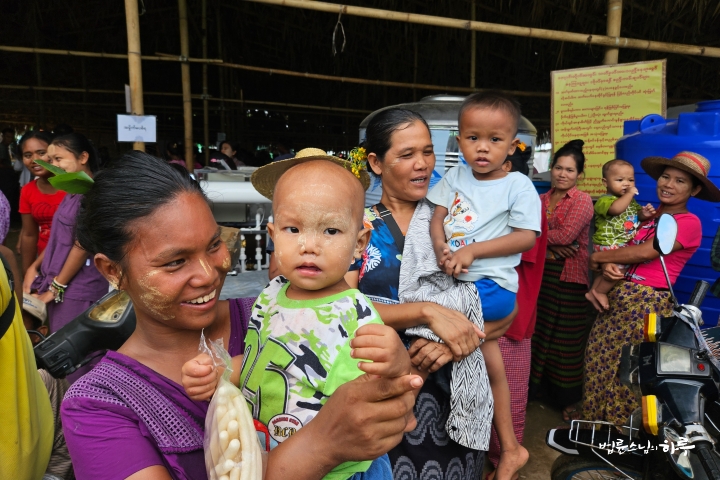
After touring the site, they had lunch at Tipitaka Nikaya Monastery near the refugee camp and then had a conversation with the monks who run the refugee camp. First, Sunim shared his feelings after directly observing the site.
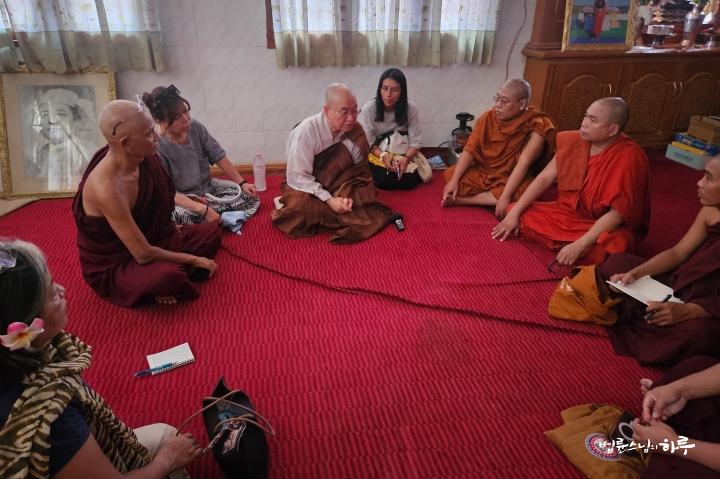
“I listened well to the explanation about the situation of this refugee camp last evening. Coming here today and looking around, while there are many shortcomings, it was better than I had thought. If you go to Cox’s Bazar in Bangladesh, over a million Rohingya refugees live there. There, UN organizations including UNHCR directly manage it, so residents cannot move freely. It’s fenced off and cut off from the outside, receiving a lot of control. But here, at least people can move freely, which is different. However, for people to live, they need to be able to drink water, eat food, and wear clothes. They also need at least a tent to shelter from rain, and they need to be able to take medicine when sick.
In his final words, the Buddha said, ‘Helping those who suffer has the same merit as making offerings to the Buddha.’ You are accumulating such merit every single day. According to the Buddha’s teachings, helping people in difficulty like this is truly Buddhist work. That’s why our Jungto Society doesn’t use donated money to build temples but uses it to help people in need like this.”
They then had focused discussions on what items were most urgently needed at the refugee camp. It was decided that JTS would provide support for drinking water, food, daily necessities, medicine, and school supplies, and the conversation concluded.
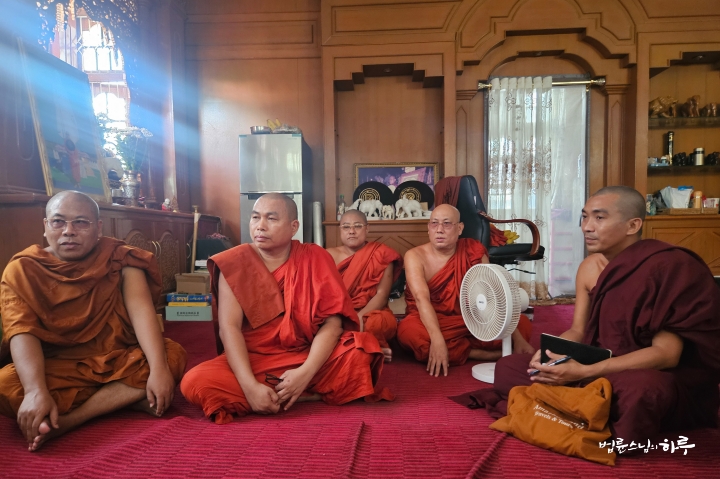
Sunim gave the monks his books translated into English as gifts and left the temple.
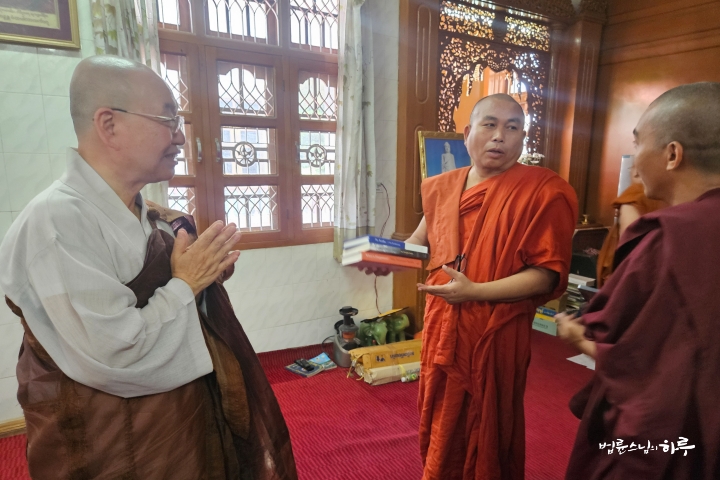
The next place visited was Shwe Yan Lin Min Kyaung Monastery.
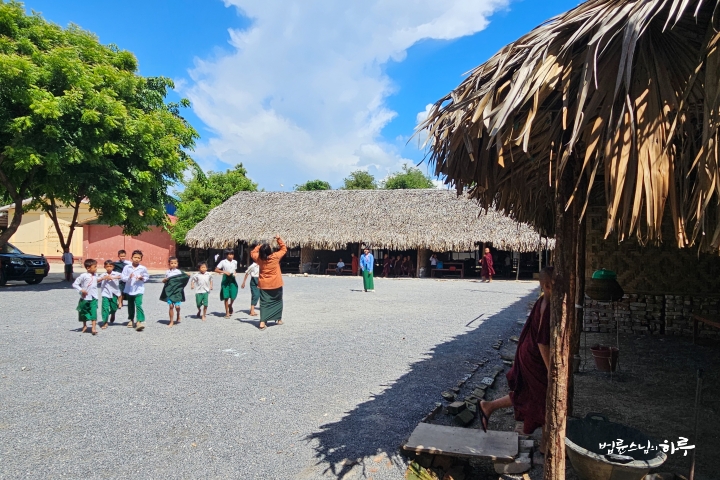
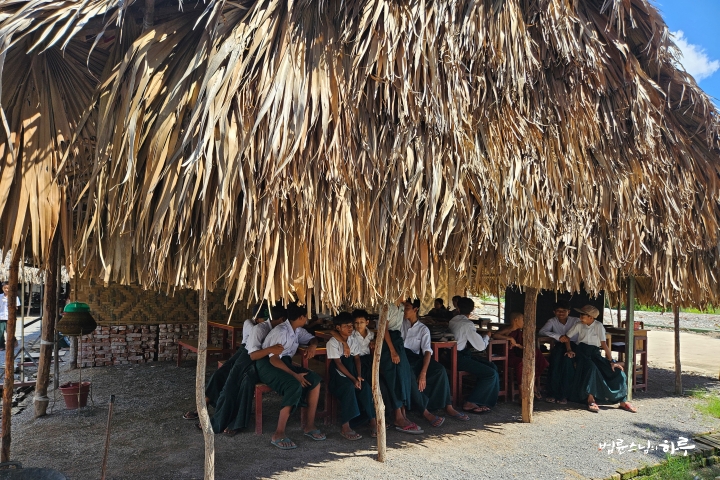
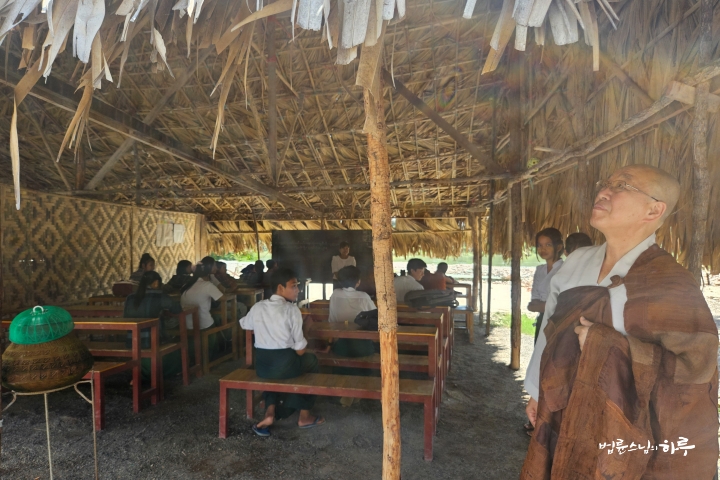
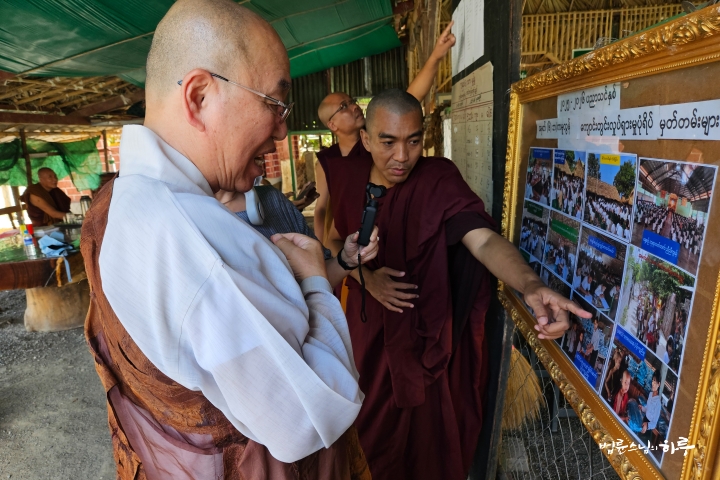
This is a school where 486 students and 68 novice monks study together. The school was destroyed by an earthquake, and classes were being held in temporary classrooms made of bamboo. The temple was generally well-organized, and the educational environment was relatively stable. So they wanted to build 10 new classrooms.
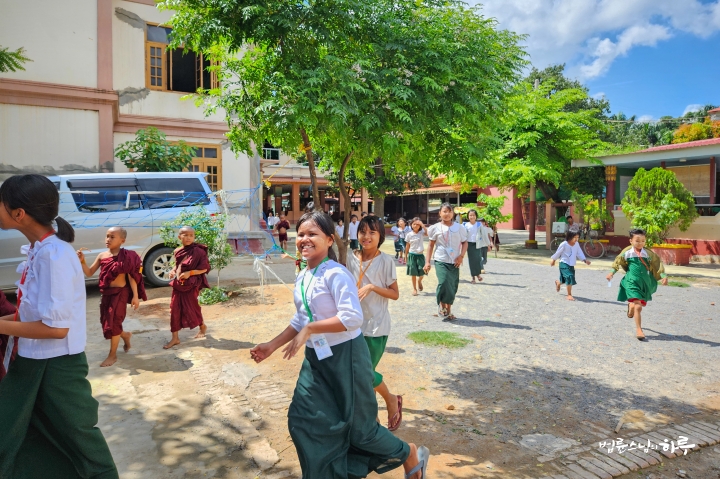
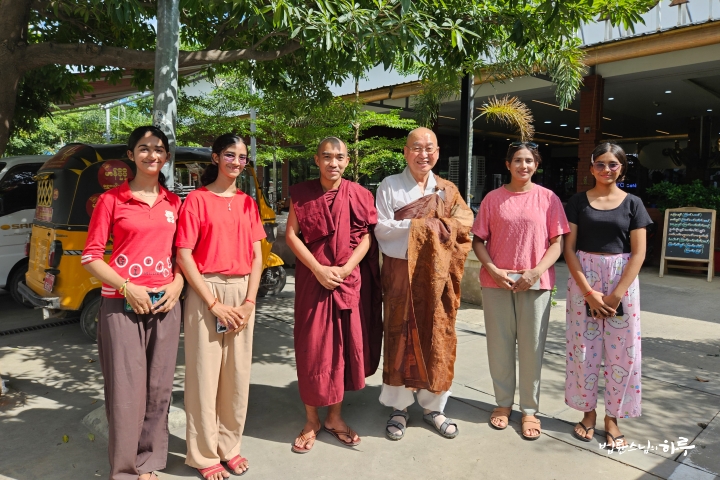
After touring the school for 30 minutes, they moved to another location.
From 3 PM, JTS relief supplies were delivered to refugees. Basic food items including rice, cooking oil, chickpeas, chicken powder, Mama noodles, and green tea were distributed to 137 households in the refugee camp.
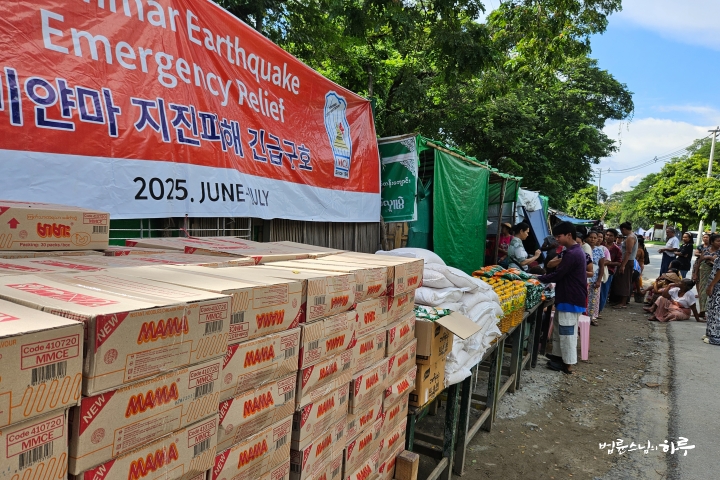
Thanks to Venerable Kittisara’s good preparation in advance, supplies could be delivered smoothly like flowing water. Items were distributed from light to heavy, and volunteers helped carry them.
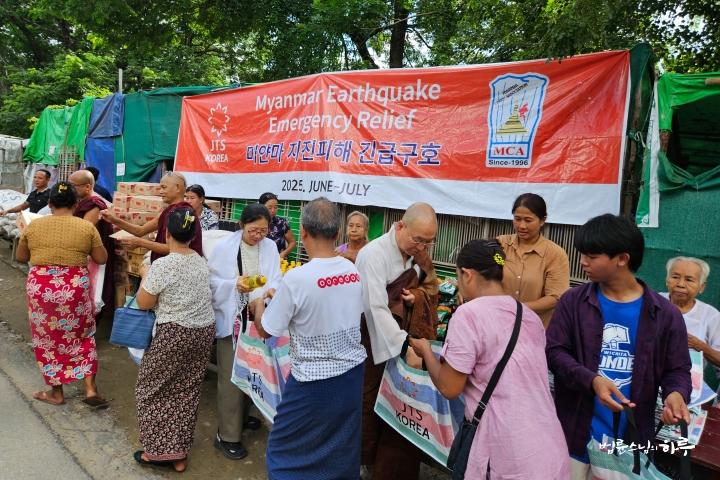
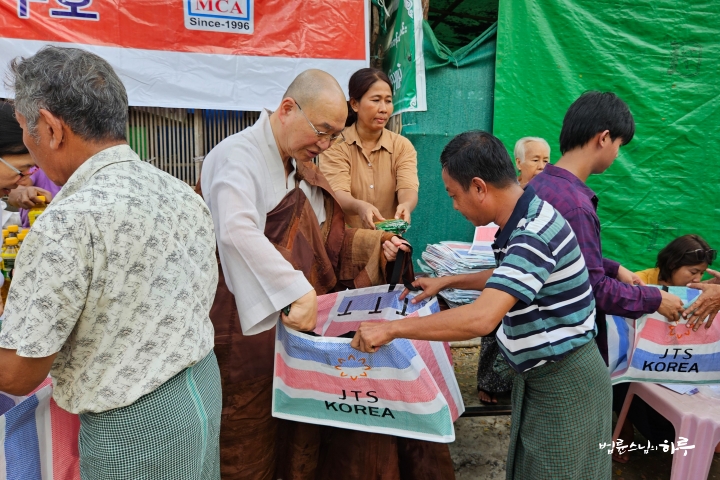
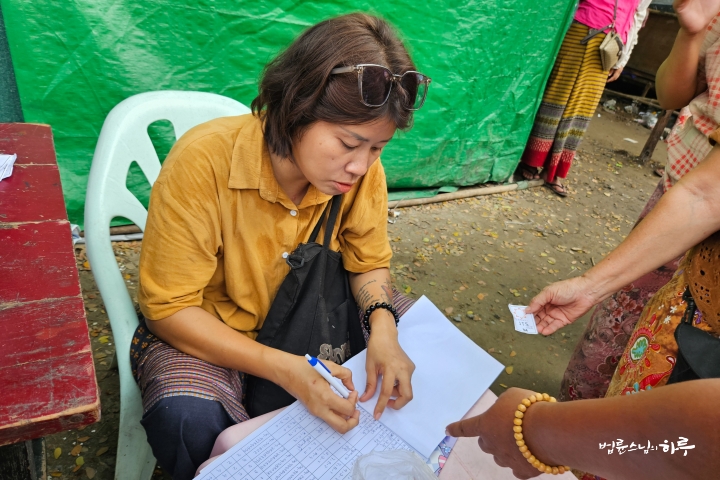
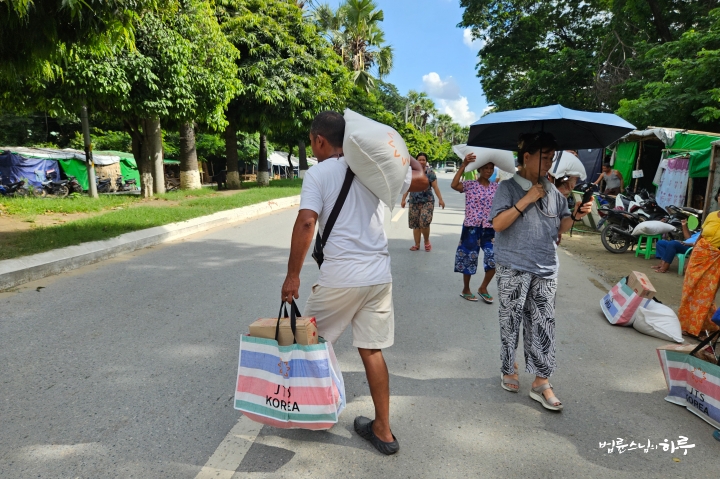
After finishing the distribution, grandmothers came to express their sincere gratitude.
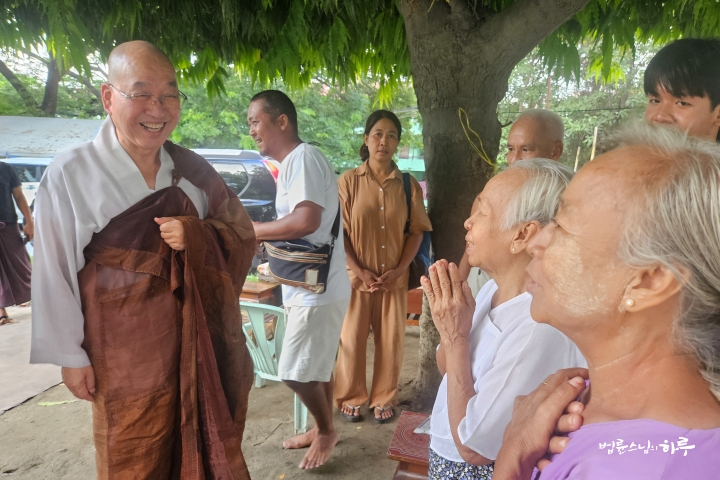
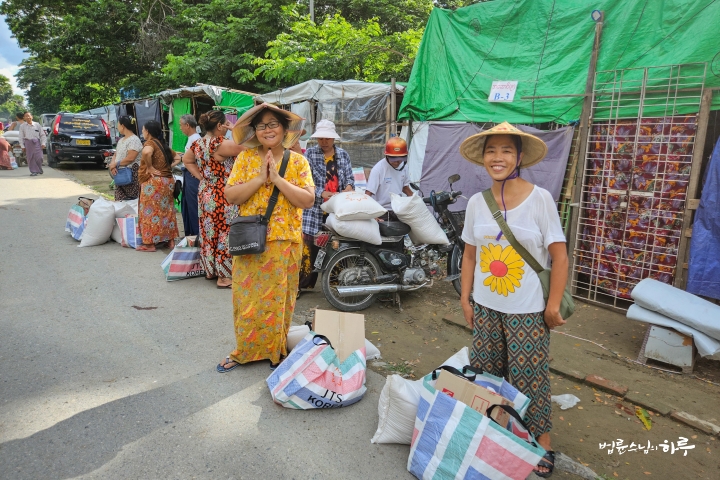
At 4 PM, they visited Phaung Daw Oo Monastic School, which has one of the large schools in Mandalay. This is an educational institution where about 1,500 students, including war-affected children, board, and about 7,000 students study. It’s a space where monks and regular students live and learn together.
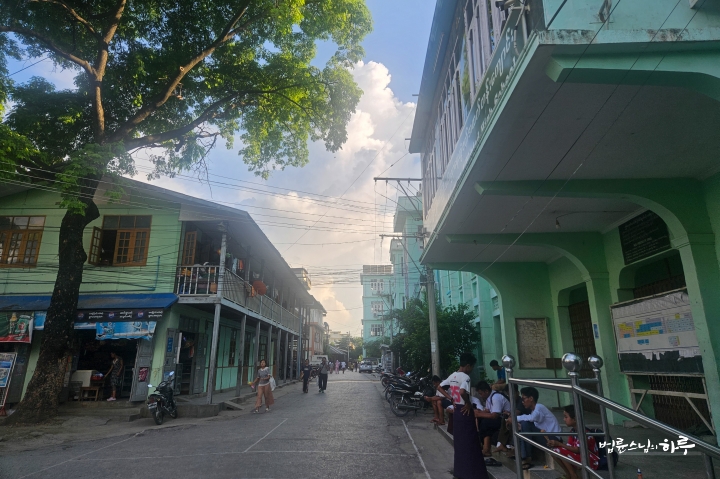
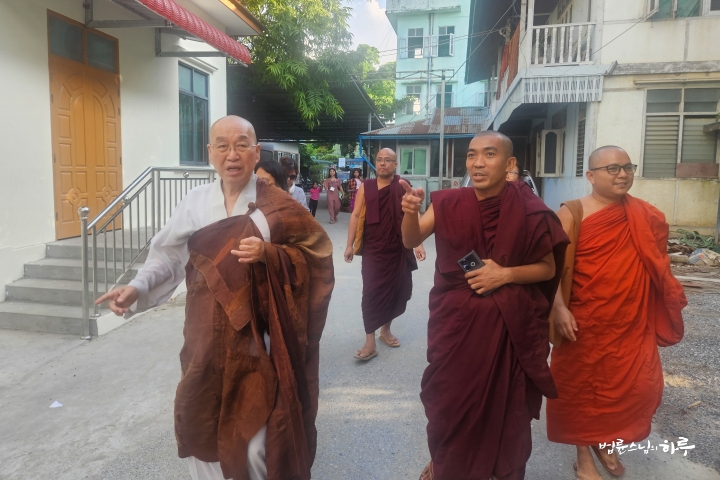
Children from various ethnic groups within Myanmar were studying together at this school. Some had come after earthquake damage. The children were generally receiving free education, and food was being provided partly through donations and partly through self-sufficiency.
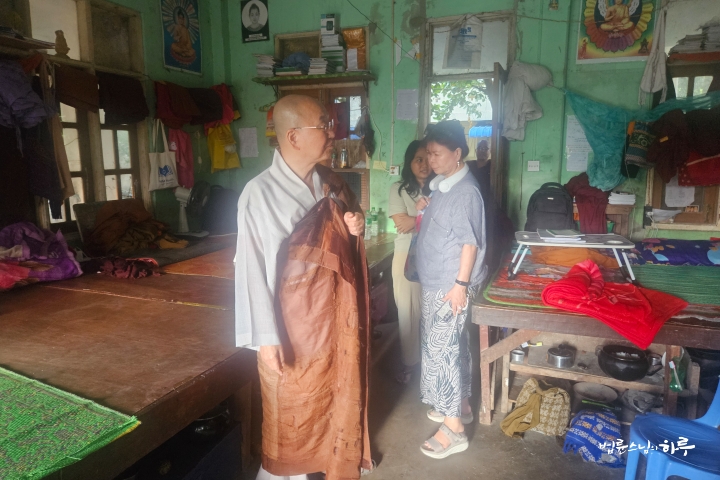
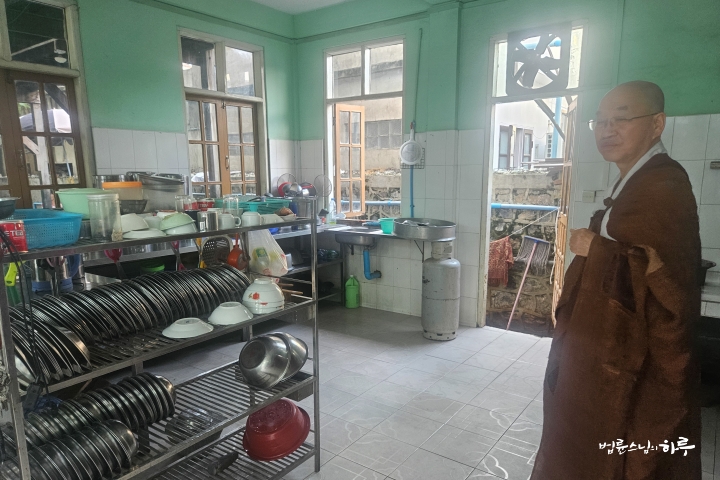
While having tea with the monk in charge of operations, Sunim asked about the financial situation needed for operations such as teacher salaries and textbook purchases. The temple was operating the school independently without government support, and was mostly handling teachers’ salaries on its own. They mainly operate with donations from international organizations abroad.
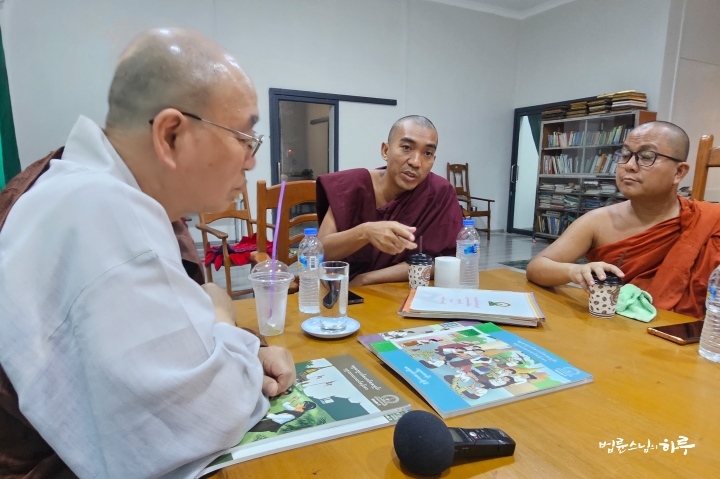
They also talked about the Sunday Dhamma schools run by temples. Before the war, Sunday Dhamma schools were operated at about 5,000 temples, but currently only 250 are open. He particularly mentioned the burden of printing costs for Dhamma school textbooks. While about 3,000 books are needed annually, it’s difficult to print all of them due to financial difficulties.
After finishing tea, Sunim gave the administrative monk his books translated into English as a gift and left the temple.
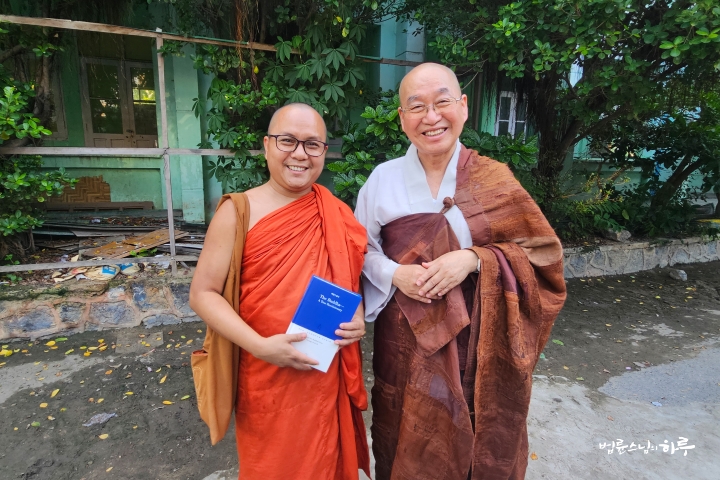
At 5:40 PM, they visited the Bodhi Aye Nyein Meditation Center run by Venerable Kittisara. This meditation center was completed in 2020, and regular meditation programs were being operated throughout the year.
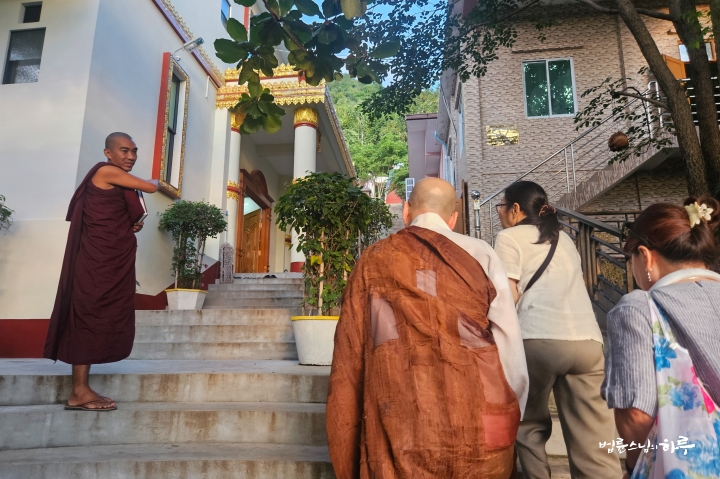
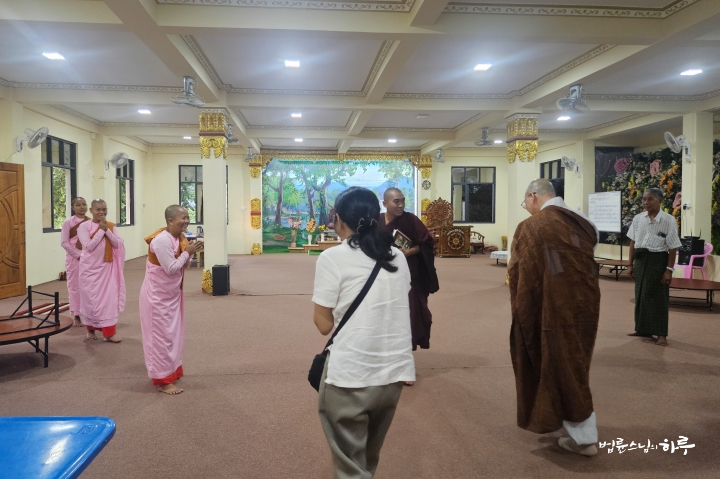
In the past, sessions were vibrant with up to 50 participants, but currently, due to civil war and earthquakes, the average has decreased to around 20. Nevertheless, Venerable Kittisara continued to lead meditation sessions steadily.
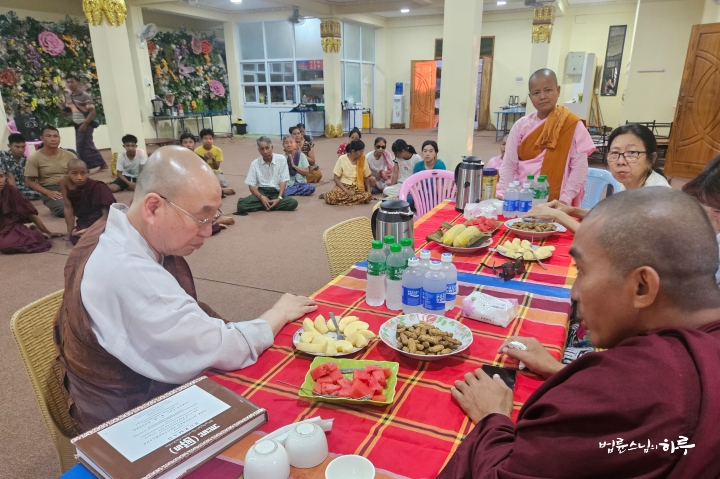
As they left the meditation center, the sunset was painting the sky.
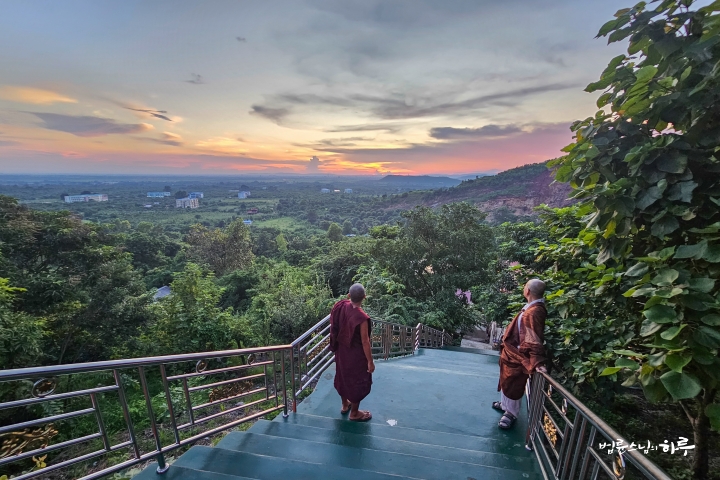
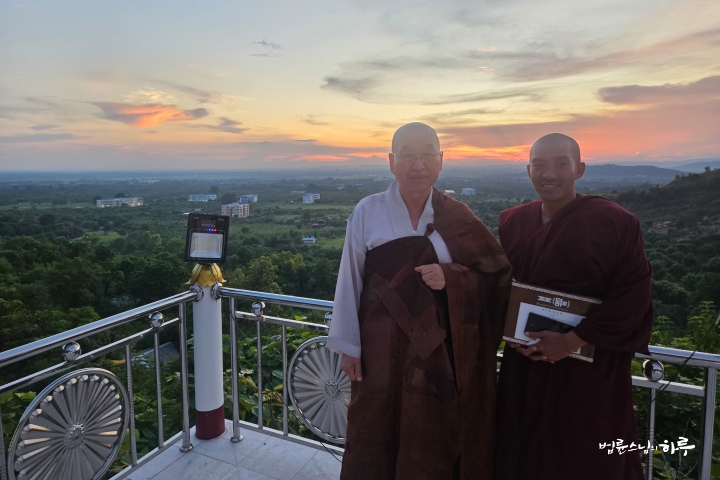
After touring the meditation center, Sunim returned to the accommodation. Starting at 7:20 PM, they held a comprehensive evaluation meeting to wrap up the two-day itinerary of visiting five educational facilities and refugee camps, and discussed future support directions.
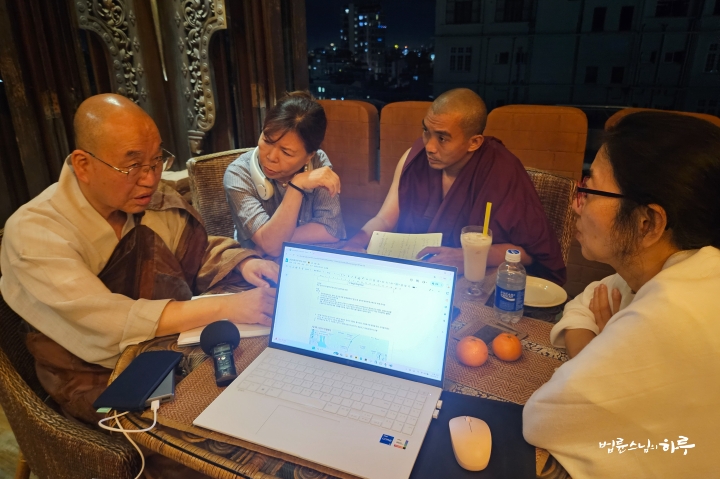
As a result of the discussion, Shwe Shat Cha Nunnery and Sagaing Civil War Refugee Camp were selected as places needing support. It was determined that Shwe Shat Cha Nunnery urgently needed facility improvements due to its extremely poor conditions. While the Sagaing Civil War Refugee Camp allowed children and residents to live relatively freely, basic necessities such as food, hygiene products, medicine, and school supplies were lacking. Accordingly, it was decided to provide food including rice and oil quarterly (four times a year), and to support essential items for daily necessities and medicine. Students would receive school supplies twice a year at the beginning of each semester, and sports equipment would be decided after further discussion.
Additionally, for Dhamma Gun Ei Myint Myint Khin Nunnery, they proposed renovating the existing building. For Shwe Yan Lin Min Kyaung Monastery’s school, they decided to review support based on how much they could self-fund and the cost estimate. Since Phaung Daw Oo Monastery’s school was already receiving help from various organizations, they decided not to provide additional support but to donate sports equipment as a commemorative gift for the visit.
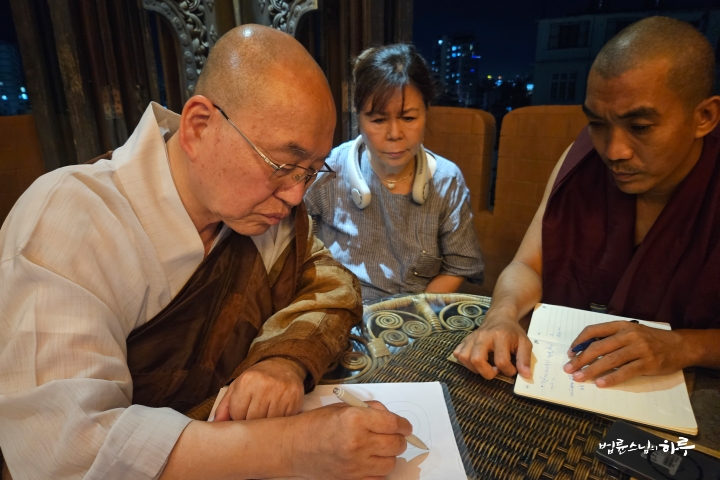
Sunim expressed gratitude to Venerable Kittisara for preparing the Myanmar visit itinerary.
“Thank you very much for preparing this visit so well. We do this work because we trust Venerable Kittisara. The content of today’s meeting will be discussed and finalized by the JTS Board of Directors. After that, we will make an official agreement regarding this matter. Please don’t overwork yourself, and do only as much as you can. JTS will support as much as Venerable Kittisara can handle.”
Sunim encouraged Venerable Kittisara and presented him with English translations of Sunim’s books as a gift.
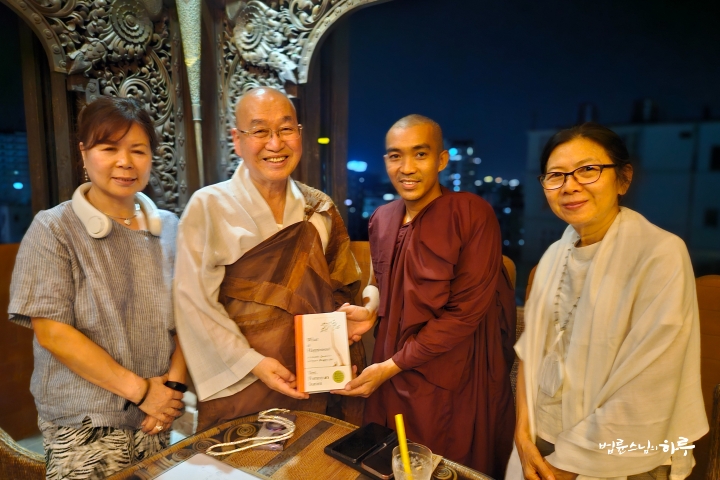
The meeting concluded at 9 PM. Sunim reviewed manuscripts before retiring for the night.
Tomorrow, Sunim will leave Myanmar for Cambodia to visit Sahaknuk Raja Buddhist University in Battambang to discuss the construction of additional female student dormitories.





